Risk
The CALP Network’s State of the World’s Cash report found that the perception that CVA is riskier than other forms of aid was one of the main barriers to CVA being routinely used. This concern is linked to the growing emphasis from donors on anti-terrorism and money laundering, and shrinking budgets for humanitarian assistance. The CALP Network’s work under this theme aims to debunk myths, facilitate collaboration, and share learning to ensure that CVA is systematically and equally considered, based on evidence of actual risks across modalities.
Current priorities
A variety of organisations are currently working on CVA and risk. The CALP Network is working to identify synergies among actors, avoid duplication, and define joint priorities that can be better addressed collectively. Together with WFP, the CALP Network is co-leading the risk priority within the Grand Bargain workstream on cash.
Featured content

Podcast: Will risk aversion hold us back from realizing the potential of CVA?
Podcast
Episode 1 of the CashCast, exploring how attitudes to risk have impacted the use of CVA in the Middle East and North Africa region.

CVA and Risks: What happens in the field, stays in the field?
Blog Post
In October 2019 in Douala, Cameroon, the CALP Network facilitated a learning event exploring the risks to beneficiary protection in Cash and Voucher Assistance (CVA). This closed-door workshop, held as part of series of meetings and webinars on theme of CVA and risk in different regions, convened 25 humanitarian workers from West and Central Africa representing local and international NGOs, UN...

Webinar: Data sharing in CVA: ethics, ownership and privacy
Event
Thematic lead
Latest

Social Protection as a Pathway to Sustaining Peace
Policy paper
Global crises are becoming the new normal. From climate change to the contemporary food price crisis, vulnerable populations – and especially rural people – are facing increasingly difficult odds of flourishing. Such challenges are even more pronounced where there is conflict, whose multidimensional...

Guidelines on policies and controls for the effective management of money laundering and terrorist financing (ML/TF) risks when providing access to financial services
Guidelines and Tools
Guidance for financial institutions on how to manage money laundering and terrorist financing risks (ML/TF) whilst not excluding vulnerable populations.

How to mitigate gender-based violence (GBV) risks in cash and voucher assistance (CVA)
Video
Cash and voucher assistance (CVA) is an important tool to help individuals affected by crises get back on their feet. But just like any other form of assistance, it is vital to ensure that it does not fuel tensions in the household or in the community and that it does not create new risks for women and...
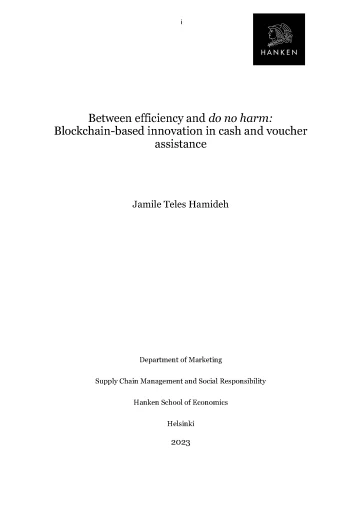
Between efficiency and do no harm: Blockchain-based innovation in cash and voucher assistance
Report
The focus of this study is the determination of the risk factors for beneficiaries that arise from the use of blockchain technology in the delivery of cash and voucher assistance (CVA), as part of a framework for the identification of digital harm. The study also aims to use the said framework to create...

Changes to US and UN economic sanctions may simplify CVA implementation
Blog Post
Recent changes to the UN and US economic sanctions regimes promise to improve cash transfer process across international borders, but changes might not be as quick or comprehensive as we would hope. We put eight questions to Rory Crew, who has looked into the matter for you.
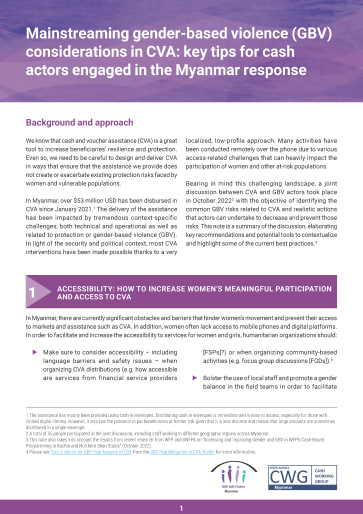
Mainstreaming Gender-based Violence (GBV) Considerations in CVA: Key tips for Cash Actors Engaged in the Myanmar Response
Case Study
In Myanmar, over $53 million USD has been disbursed in CVA since January 2021. The delivery of the assistance has been impacted by tremendous context-specific challenges, both technical and operational as well as related to protection or gender-based violence (GBV). In light of the security and political...
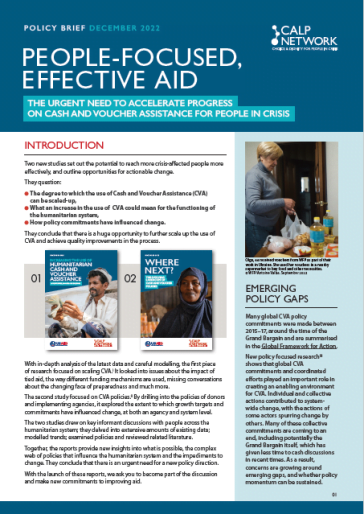
People-focused, effective aid: The urgent need to accelerate progress on cash and voucher assistance for people in crisis
Policy paper
Setting out a clear case for action, this Policy Brief outlines the latest evidence and information around how CVA is being used, and if it is meeting its potential to support people in crisis. It urges us to define and commit to a new collective vision for the development of CVA.
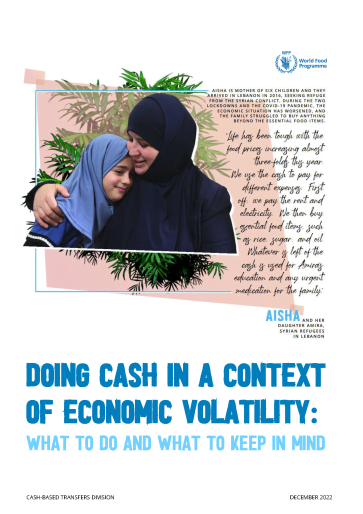
Doing Cash in a context of economic volatility: What to do and what to keep in mind
Guidelines and Tools
This interim WFP guidance was issued in 2022 to provide support to cash operations in contexts of economic volatility, be it when there is inflation, depreciation or currency volatility, parallel exchange rates, liquidity issues and changes in financial regulation, among others.

Operational research on GBV risk mitigation in relation to CVA in humanitarian settings – UNFPA/GWI collaborative research
Case Study
The Global Women’s Institute at George Washington University and UNFPA have launched a collaboration to examine GBV risk mitigation in relation to CVA in humanitarian settings in order to: (a) further corroborate the presence of GBV risks to women and girls in current CVA programming; and b) develop...
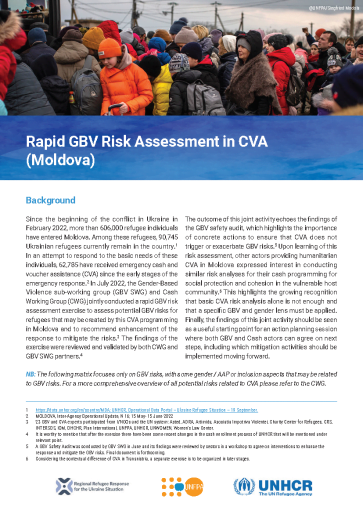
Moldova: Rapid GBV Risk Assessment in CVA
Case Study
Since the beginning of the conflict in Ukraine in February 2022, more than 606,000 refugee individuals have entered Moldova. Among these refugees, 90,745 Ukrainian refugees currently remain in the country. In an attempt to respond to the basic needs of these individuals, 62,785 have received emergency...

From Risk to Choice: Cash within GBV Case Management in Jordan
Case Study
In 2021, the United Nations Population Fund (UNFPA) in Jordan piloted the integration of cash assistance within gender-based violence (GBV) programming. The pilot targeted GBV survivors and women at risk of GBV – including Jordanians, Syrian refugees and refugees of other nationalities – within the...
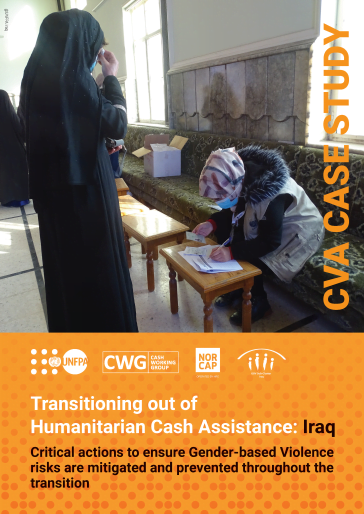
Transitioning out of Humanitarian Cash Assistance in Iraq: Critical Actions to Ensure Gender-based Violence Risks are Mitigated and Prevented throughout the Transition
Case Study
In light of ongoing efforts to transition away from humanitarian Cash assistance in Iraq, a two-day workshop took place in Erbil on June 22 which gathered more than 32 gender-based violence (GBV) and cash and voucher assistance (CVA) actors with the goal of identifying priorities for the transition period...

Briefing Note on Panel Discussion between DCF and Partners on Exchange Rates and Cash Assistance
Meeting minutes
This briefing note summarises the key points from a discussion held between the Donor Cash Forum (DCF) and partners on 4th April 2022. The rationale for this session is the increasing number of humanitarian contexts experiencing inflation and/or depreciation, with significant impacts on humanitarian...

Delivering Better Together: Standard Operating Procedures for Oxfam’s Approach to Cash and Voucher Assistance
Guidelines and Tools
Delivering Better Together: SOPs for Oxfam’s Approach to Cash and Voucher Assistance is a digital guide to all things cash and vouchers in Oxfam that can be downloaded to and accessed from a phone, tablet, or any other device. The SOPs focus on the basics of cash and vouchers, the use of it for...
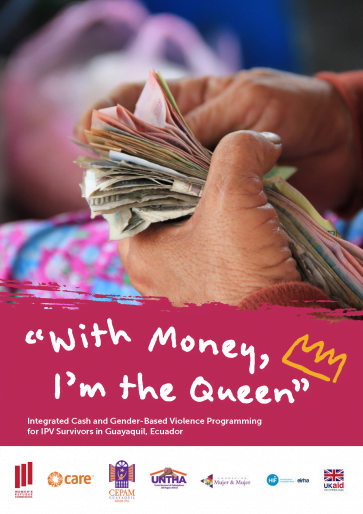
Integrated Cash and Gender-Based Violence Programming for IPV Survivors in Guayaquil, Ecuador
Case Study
Migrant and refugee women and girls are vulnerable to a range of risks before, during, and after humanitarian crises. Intimate partner violence (IPV) is a type of gender-based violence (GBV) and is among the many protection-specific risks they face. As a result of the conflict in Venezuela, an estimated...

Digital Feast and Famine: Digital Technologies and Humanitarian Law in Food Security, Starvation and Famine Risk
Report
This working paper presents the findings of a brief exploratory study into the role of digital technologies in International Humanitarian Law (IHL) and its implications for starvation and famine risk. It is a work in progress, intended to raise issues rather than reach definitive conclusions (given the...
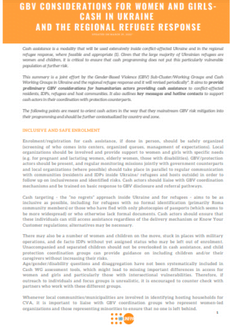
GBV Considerations for Women and Girls- Cash in Ukraine and the Regional Refugee Response- UNFPA 2022
Guidelines and Tools
Cash assistance is a modality that will be used extensively inside conflict-affected Ukraine and in the regional refugee response, where feasible and appropriate (1). Given that the large majority of Ukrainian refugees are women and children, it is critical to ensure that cash programming does not put...
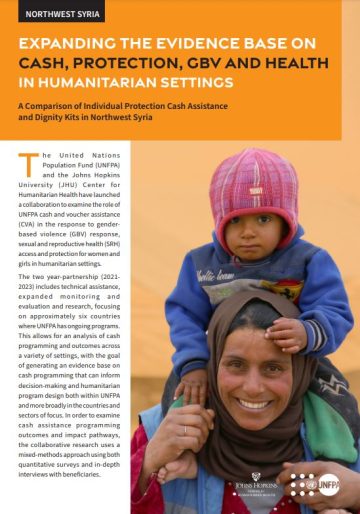
Expanding the Evidence Base on Cash, Protection, GBV and Health in Humanitarian Settings Findings from Northwest Syria: A Comparison of Individual Protection Assistance and Dignity Kits
Case Study
As part of 2021 programming in northwest Syria, UNFPA and its implementing partners provided dignity kits (hygiene and sanitary products) and individual protection assistance (IPA, a one-off unconditional cash transfer) to those in need. The two interventions were intended to provide immediate assistance...
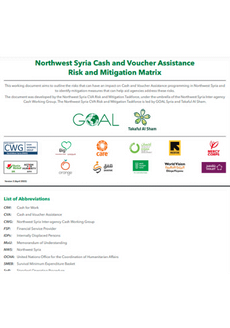
Northwest Syria Cash and Voucher Assistance Risk and Mitigation Matrix
Guidelines and Tools
This risk matrix is a working document which outlines the key risks that can have an impact on Cash and Voucher Assistance programming in Northwest Syria and identifies mitigation measures that can help aid agencies address these risks. These CVA risks and mitigation measures were identified through an...
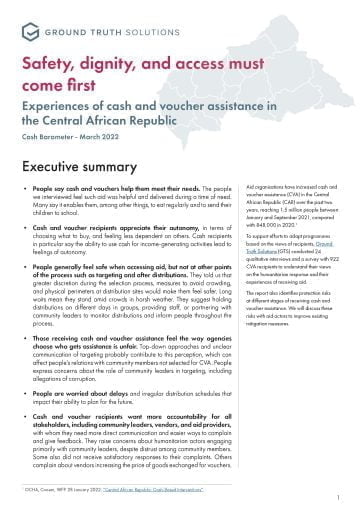
Safety, Dignity, and Access Must Come First: Experiences of Cash and Voucher Assistance in the Central African Republic
Report
Aid organisations have increased cash and voucher assistance (CVA) in the Central African Republic (CAR) over the past two years, reaching 1.5 million people between January and September 2021, compared with 848,000 in 2020. To support efforts to adapt programmes based on the views of recipients, Ground...



